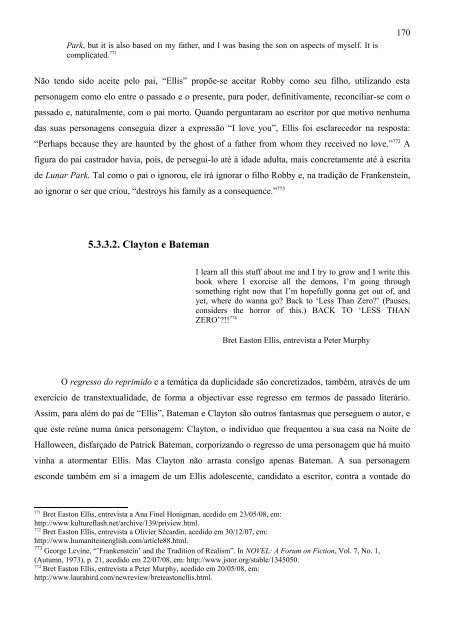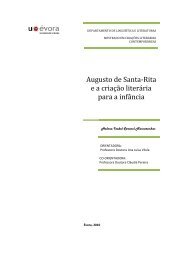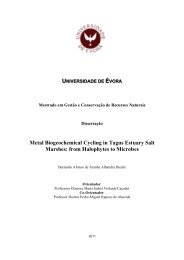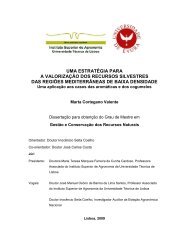João LuÃs Nabo - Index of - Universidade de Évora
João LuÃs Nabo - Index of - Universidade de Évora
João LuÃs Nabo - Index of - Universidade de Évora
You also want an ePaper? Increase the reach of your titles
YUMPU automatically turns print PDFs into web optimized ePapers that Google loves.
Park, but it is also based on my father, and I was basing the son on aspects <strong>of</strong> myself. It is<br />
complicated. 771<br />
Não tendo sido aceite pelo pai, “Ellis” propõe-se aceitar Robby como seu filho, utilizando esta<br />
personagem como elo entre o passado e o presente, para po<strong>de</strong>r, <strong>de</strong>finitivamente, reconciliar-se com o<br />
passado e, naturalmente, com o pai morto. Quando perguntaram ao escritor por que motivo nenhuma<br />
das suas personagens conseguia dizer a expressão “I love you”, Ellis foi esclarecedor na resposta:<br />
“Perhaps because they are haunted by the ghost <strong>of</strong> a father from whom they received no love.” 772 A<br />
figura do pai castrador havia, pois, <strong>de</strong> persegui-lo até à ida<strong>de</strong> adulta, mais concretamente até à escrita<br />
<strong>de</strong> Lunar Park. Tal como o pai o ignorou, ele irá ignorar o filho Robby e, na tradição <strong>de</strong> Frankenstein,<br />
ao ignorar o ser que criou, “<strong>de</strong>stroys his family as a consequence.” 773<br />
5.3.3.2. Clayton e Bateman<br />
I learn all this stuff about me and I try to grow and I write this<br />
book where I exorcise all the <strong>de</strong>mons, I’m going through<br />
something right now that I’m hopefully gonna get out <strong>of</strong>, and<br />
yet, where do wanna go? Back to ‘Less Than Zero?’ (Pauses,<br />
consi<strong>de</strong>rs the horror <strong>of</strong> this.) BACK TO ‘LESS THAN<br />
ZERO’?!! 774<br />
Bret Easton Ellis, entrevista a Peter Murphy<br />
O regresso do reprimido e a temática da duplicida<strong>de</strong> são concretizados, também, através <strong>de</strong> um<br />
exercício <strong>de</strong> transtextualida<strong>de</strong>, <strong>de</strong> forma a objectivar esse regresso em termos <strong>de</strong> passado literário.<br />
Assim, para além do pai <strong>de</strong> “Ellis”, Bateman e Clayton são outros fantasmas que perseguem o autor, e<br />
que este reúne numa única personagem: Clayton, o indivíduo que frequentou a sua casa na Noite <strong>de</strong><br />
Halloween, disfarçado <strong>de</strong> Patrick Bateman, corporizando o regresso <strong>de</strong> uma personagem que há muito<br />
vinha a atormentar Ellis. Mas Clayton não arrasta consigo apenas Bateman. A sua personagem<br />
escon<strong>de</strong> também em si a imagem <strong>de</strong> um Ellis adolescente, candidato a escritor, contra a vonta<strong>de</strong> do<br />
771 Bret Easton Ellis, entrevista a Ana Finel Honigman, acedido em 23/05/08, em:<br />
http://www.kultureflash.net/archive/139/priview.html.<br />
772 Bret Easton Ellis, entrevista a Olivier Sécardin, acedido em 30/12/07, em:<br />
http://www.humaniteinenglish.com/article88.html.<br />
773 George Levine, “’Frankenstein’ and the Tradition <strong>of</strong> Realism”. In NOVEL: A Forum on Fiction, Vol. 7, No. 1,<br />
(Autumn, 1973), p. 21, acedido em 22/07/08, em: http://www.jstor.org/stable/1345050.<br />
774 Bret Easton Ellis, entrevista a Peter Murphy, acedido em 20/05/08, em:<br />
http://www.laurahird.com/newreview/breteastonellis.html.<br />
170








